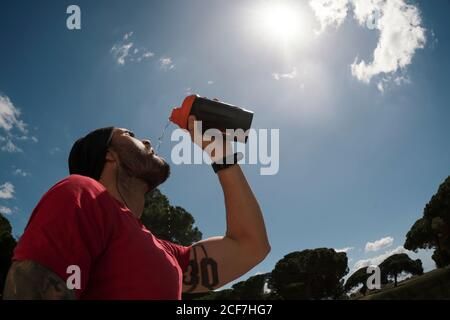
Drink During Training – Is It Possible or Not?
When it comes to physical training and exercise, there is often a debate about whether or not it is advisable to drink fluids during a workout. Some argue that consuming liquids can interfere with performance, while others emphasize the importance of hydration for optimal athletic performance. In this article, we will explore the topic of drinking during training and examine the factors that influence the need for fluids during exercise.
The Importance of Hydration:
Staying properly hydrated is crucial for overall health and well-being, and it becomes even more important during physical activity. When we exercise, our bodies lose water through sweating, which can lead to dehydration if not replenished. Dehydration can cause a range of negative effects, including decreased performance, muscle cramps, dizziness, and even heat stroke in extreme cases.
Factors to Consider:
Intensity and Duration of Exercise: The need for fluids during training largely depends on the intensity and duration of the activity. Longer, more intense workouts, such as endurance running or high-intensity interval training, generally require more fluids to compensate for the increased sweat loss. Shorter, less intense exercises may not necessitate immediate fluid consumption.
Environmental Conditions: The environment in which you are training also plays a significant role in determining your fluid needs. Exercising in hot and humid conditions can cause excessive sweating, leading to faster fluid depletion. On the other hand, cooler environments may result in less noticeable fluid loss, but hydration is still important.
Individual Variations: Each individual has unique hydration requirements based on factors such as body size, metabolism, and sweat rate. Some people naturally sweat more than others, leading to higher fluid needs. Understanding your body's response to exercise and its hydration needs is essential for optimizing performance.
The Benefits of Drinking During Training:
Optimal Performance: Consuming fluids during exercise helps maintain proper hydration levels, which can enhance performance. When the body is adequately hydrated, it functions more efficiently, allowing you to train harder and longer.
Temperature Regulation: Drinking fluids during physical activity helps regulate body temperature. Sweating is the body's natural cooling mechanism, and replacing lost fluids ensures the body can continue to regulate temperature effectively.
Sustained Energy Levels: Hydration plays a vital role in maintaining energy levels during a workout. Dehydration can lead to fatigue and reduced endurance, while adequate fluid intake can provide the necessary energy to push through intense training sessions.
Guidelines for Drinking During Training:
Pre-Exercise Hydration: Begin your workout well-hydrated by consuming fluids beforehand. Aim to drink around 16 to 20 ounces (480 to 590 ml) of water 2 to 3 hours before exercising and an additional 8 to 10 ounces (240 to 295 ml) 10 to 20 minutes before starting.
During Exercise Hydration: During training, aim to drink fluids at regular intervals. A general guideline is to consume about 7 to 10 ounces (210 to 295 ml) every 10 to 20 minutes, especially during more prolonged and intense workouts. Water is usually sufficient for most exercise durations, but for workouts lasting longer than 60 minutes or in intense heat, sports drinks containing electrolytes can help replenish lost minerals.
Post-Exercise Hydration: After training, continue to rehydrate to replace the fluids lost during the workout. Consuming water or a recovery beverage with electrolytes can aid in replenishing hydration levels.
In conclusion, drinking fluids during training is not only possible but also crucial for maintaining optimal performance and preventing dehydration-related complications. Adequate hydration before, during, and after exercise ensures that the body can regulate temperature, sustain energy levels, and perform at its best.